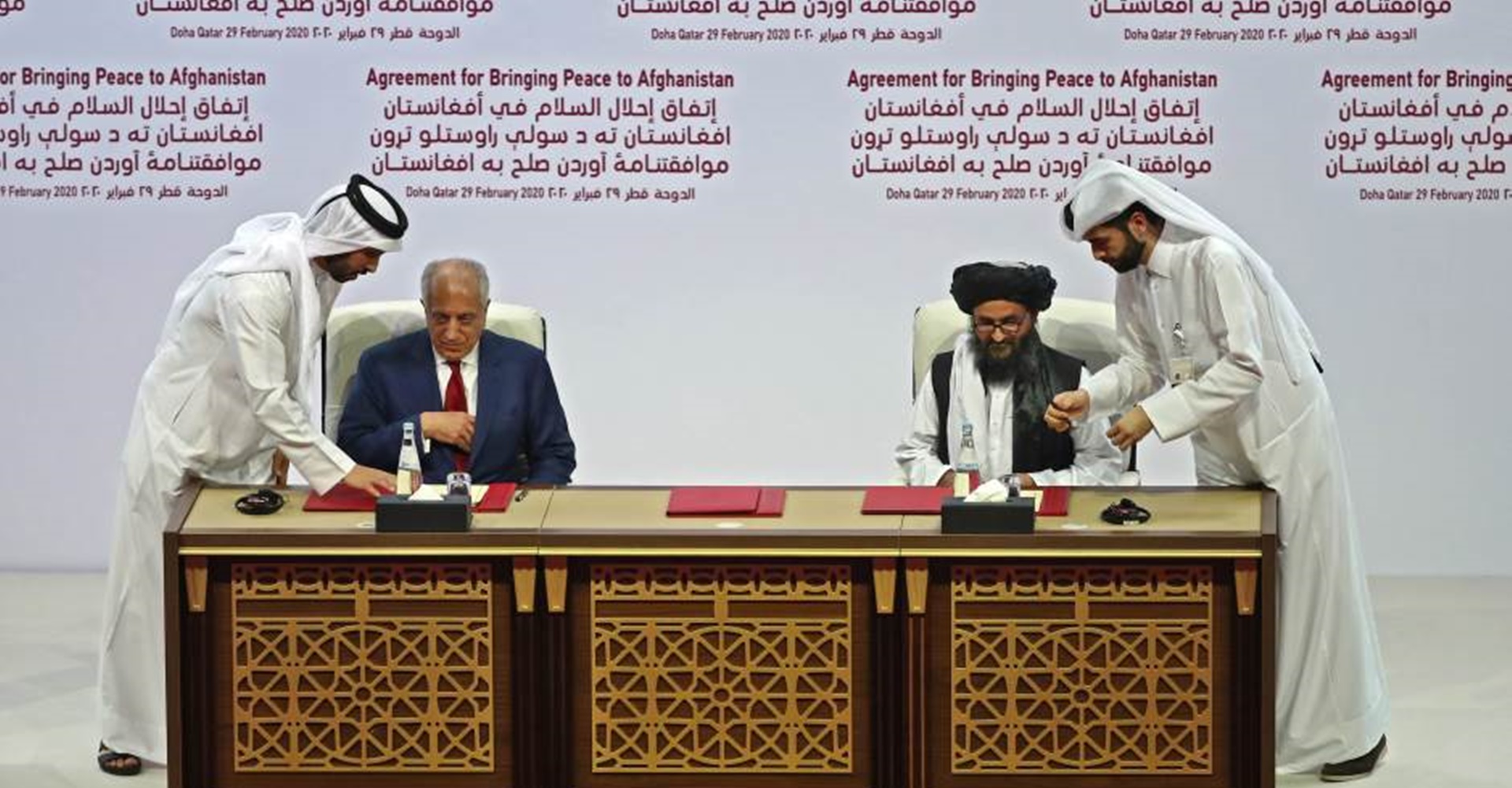After a week-long “reduction in violence,” the US and Taliban have signed a historic agreement Saturday, which would set into motion the drawdown of US troops from Afghanistan and potentially pave the way to ending America’s longest-fought war.
The agreement was signed in Doha, Qatar, by US Special Representative for Afghanistan Reconciliation Zalmay Khalilzad — the chief US negotiator in the talks with the Taliban — and Mullah Abdul Ghani Baradar — the Taliban’s chief negotiator. Secretary of State Mike Pompeo witnessed the signing.
Speaking at the ceremony, Pompeo said the US “will closely watch the Taliban’s compliance with their commitments, and calibrate the pace of our withdrawal to their actions.”
“This is how (we) will ensure that Afghanistan never again serves for international terrorists,” Pompeo said.
Secretary of Defense Mark Esper was in Kabul, Afghanistan, on Saturday for a joint declaration ceremony with Afghan President Ashraf Ghani.
According to Afghanistan’s national security adviser Hamdullah Mohib, the joint US-NATO-Afghan declaration includes an 18-month withdrawal of foreign troops.
“But it is conditional on the agreement between the Taliban and the United States. If those conditions are not met, this date will also change,” he said.
President Donald Trump announced Friday that he had dispatched Pompeo to “witness the signing of an agreement with representatives of the Taliban” and Esper to “issue a joint declaration with the government of Afghanistan.”
“If the Taliban and the government of Afghanistan live up to these commitments, we will have a powerful path forward to end the war in Afghanistan and bring our troops home,” Trump said in a statement. “These commitments represent an important step to a lasting peace in a new Afghanistan, free from Al Qaeda, ISIS, and any other terrorist group that would seek to bring us harm.”
The deal was inked in Doha, Qatar, which served as the base for on-and-off talks between US and Taliban negotiators for more than a year. Those negotiations have been led on the US side by Special Representative for Afghanistan Reconciliation Zalmay Khalilzad. The two sides had reached “an agreement in principle” in early September 2019, Khalilzad said at the time. Shortly thereafter, Trump called off the talks and said he cancelled a secret Camp David summit with the militant group after they took credit for a deadly attack in Kabul that killed a US service member.
In a surprise visit to Afghanistan in November, Trump announced that the talks had restarted. The US President made the announcement shortly after the Taliban released an American and Australian professor in exchange for the release of three Taliban prisoners by the Afghan government. The State Department announced in early December that Khalilzad had rejoined talks with the Taliban in the Qatari capital.
The signing of the agreement sees the realization of a campaign promise for Trump, who has sought to diminish US involvement in wars overseas. Under the plan, the American military presence would be reduced to 8,600 troops from the current 12,000 to 13,000 over the course of 135 days, according to two sources familiar with the agreement.
Pompeo, speaking at the State Department Tuesday, noted that such a drawdown would be “conditions-based,” adding that it “sets a high bar for the things that will take place in order for America to ensure that we can accomplish both of those missions: a peace and reconciliation solution in Afghanistan and ensuring that the homeland continues to be as risk-free as we can possibly make it.”
A senior Afghan politician told CNN Friday that the Afghan government is wary about the upcoming deal, which is meant to trigger an intra-Afghan dialogue between Afghan stakeholders and the Taliban.
“These negotiations, if they take place, will be the first time that Afghans representing all sides of the conflict will sit down together and begin the hard work of reconciliation,” Pompeo said Tuesday.
Developing the team to send to the talks has been deeply challenging but the tentative plan is for each side — the Afghans and the Taliban — to have 15 representatives, sources told CNN earlier this week.
Members of Congress and regional experts have raised concerns about the deal, which has yet to be made public. On Wednesday, Rep. Liz Cheney led a group of 21 other Republican lawmakers in expressing “serious concerns” about the anticipated agreement.
In a letter to Pompeo and Esper, they wrote that they are “are seeking assurances that you will not place the security of the American people into the hands of the Taliban, and undermine our ally, the current government of Afghanistan.”
There were a record-high number of attacks carried out in Afghanistan last year by the Taliban and other anti-government groups. The violence in Afghanistan has continued this year, with the Taliban killing two US service members earlier this month.
There are also concerns that a deal with the Taliban could put at risk the gains made by Afghan civil society and women. Repeatedly pressed about a commitment to women’s rights, Pompeo on Tuesday did not specifically answer.
“Our mission set there has been much broader than that,” Pompeo said.
“Our mission set there is to deliver good security outcomes for the Afghan people, to let their political process work its way through,” he said. “I’m very confident that the very concerns that you raised will be addressed as part of these conversations.”
ba.n1info.com / balkantimes.press
Napomena o autorskim pravima: Dozvoljeno preuzimanje sadržaja isključivo uz navođenje linka prema stranici našeg portala sa koje je sadržaj preuzet. Stavovi izraženi u ovom tekstu autorovi su i ne odražavaju nužno uredničku politiku The Balkantimes Press.
Copyright Notice: It is allowed to download the content only by providing a link to the page of our portal from which the content was downloaded. The views expressed in this text are those of the authors and do not necessarily reflect the editorial policies of The Balkantimes Press.

